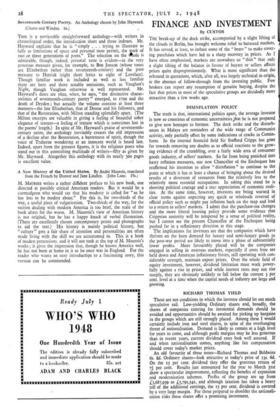FINANCE AND INVESTMENT
By CUSTOS
THE break-up of the dock strike, accompanied by a slight lifting of the clouds in Berlin, has brought welcome relief to harassed markets. It has served, at least, to induce some of the " bears " to make cover- ing purchases which have led to a sharp recovery in prices. As I have often emphasised, markets are nowadays so " thin " that only a slight tilting of the balance in favour of buyers or sellers affects prices quite disproportionately. What is more significant than the rebound in quotations, which, after all, was largely technical in origin, is the absence of follow-through from the investing public. Few brokers can report any resumption of genuine buying, despite the fact that prices in most of the speculative groups are decidedly more attractive than a few weeks ago.
DISINFLATION POLICY
The truth is that, international politics apart, the average investor is now so conscious of economic uncertainties Jhat he is not prepared to give new hostages to fortune. The dock strike and the disturb- ances in Malaya are reminders of the wide range of Communist activity, only partially offset by some indications of cracks in Comin- form. In the internal financial field Sir Stafford Cripps has gone far towards removing any doubts as to official reactions to the grow- ing evidence of the crumbling, over a fairly wide area of consumer goods industry, of sellers' markets. So far from being panicked into hasty reflation measures, our new Chancellor of the Exchequer has reaffirmed his intention to allow " disinflation " to continue to the point at which it has at least a chance of bringing about the desired results of a diversion of resources from the relatively less to the relatively more essential occupations. In taking this stand he is showing political courage and a true appreciation of economic reali- ties. At the same time, however, investors are being warned in clear terms against expecting any quick or wholesale reversal of official policy such as might put inflation back on the map and lead to a return to sellers' markets. I admit that the purchase-tax changes and the more liberal housing policy provide some evidence that Crippsian austerity will be tempered by a sense of political reality, but I. cannot see the present Chancellor of the Exchequer being pushed far in a reflationary direction at this stage.
The implications for investors are that the companies which have thriven on the keen demand for luxury and semi-luxury goods in the post-war period are likely to move into a phase of substantially lower profits. More favourably placed will be the companies engaged in selling in overseas markets, especially if costs here are held down and American inflationary forces, still operating with con- siderable strength, maintain export prices. Over the whole field of equity investment, however, dividend limitation must work power- fully against a rise in prices, and while interest rates may not rise steeply, they are obviously unlikely to fall below the current 3 per cent. level at a time when the capital needs of industry are large and growing.
RICHARD THOMAS YIELD
These are not conditions in which the investor should let out much speculative sail. Low-yielding Ordinary shares and, broadly, the shares of companies catering for inessential demands should be avoided and opportunities should be awaited for picking up bargains in the groups which are still strongly placed. Among these I would certainly include iron and steel shares, in spite of the overhanging threat of nationalisation. Demand is likely to remain at a high level for years to come, and although profit margins may be less generous than in recent years, current dividend rates look well assured. If and when nationalisation comes, anything like fair compensation should cover today's market prices.
An old favourite of these notes—Richard Thomas and Baldwins 6s. 8d. Ordinary shares—look attractive at today's price of 13s. 6d. On the 15 per cent. dividend they offer the generous return of 71 per cent. Results just announced for the year to March 31st show a spectacular improvement, reflecting the benefits of expansion and modernisation schemes. Profits of the group are up from £3,687,939 to £5,791,541, and although taxation has taken a heavy toll of the additional earnings, the 15 per cent. dividend is covered by a very large margin. For those prepared to shoulder the nationali- sation risks these shares offer a promising investment.






































 Previous page
Previous page